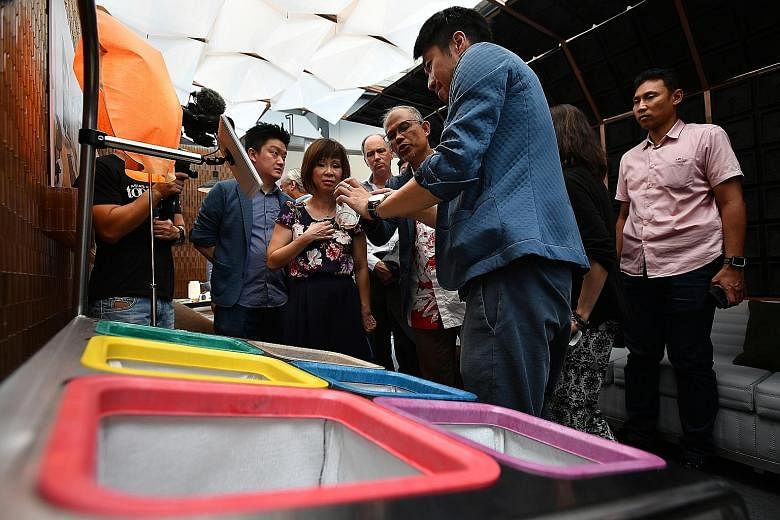One of the lessons of his youth was his parents teaching him not to waste anything - food, water, electricity - and Minister for the Environment and Water Resources Masagos Zulkifli hopes the launch of Singapore's Year Towards Zero Waste will inspire future generations to continue this vision.
If done right, the country will also be able to create new economic opportunities for local businesses and jobs for Singaporeans, he said yesterday at Our Tampines Hub.
The onus is, however, on Singaporeans to consciously act to treasure their resources and protect their environment, he added.
As part of Singapore's Year Towards Zero Waste this year, public consultations will be held to contribute to the inaugural Zero Waste Masterplan, which will highlight strategies that the Government will implement in the next few years.
One example is the introduction of the extended producer responsibility approach to managing e-waste by 2021, which would compel producers of electrical and electronic equipment here to ensure their products are collected and recycled or disposed of at the end of their lifespans.
The Ministry of the Environment and Water Resources and the National Environment Agency will publish the masterplan in the second half of this year.
A #RecycleRight movement will also be launched to get Singaporeans to recycle correctly, such as by keeping recyclable items clean, dry and free from food contamination.
-
20%
-
Percentage that the domestic recycling rate has hovered around for the past few years.
In addition, a grant will be introduced to support relevant ground-up projects. More details on this will be announced later.
The year-long campaign hopes to raise awareness of waste issues and the need to treasure resources.
"This requires a paradigm shift. We need to adopt a circular economy approach," said Mr Masagos, referring to the economic model which aims to reuse and recycle resources for as long as possible.
"Traditionally, we use resources in a linear fashion. But one aspect of the circular economy is to turn trash into treasure by reusing and recycling our resources endlessly."
He cited how local fruit juice manufacturer, Australian Fruit Juice, has partnered upcycling solutions provider UglyGood to process waste fruit peels as ingredients for producing organic cleaning agents.
"In doing so, they turn trash into treasure, generating new economic value from something that would otherwise have been thrown away. They have also created new green jobs, as skilled workers would be required to perform the conversion process," he added. "Each of us can contribute in our own way towards a zero-waste Singapore."
However, observers believe Singapore's highly urbanised environment and poor recycling habits are stumbling blocks in its quest to be a zero-waste nation. The domestic recycling rate has hovered around 20 per cent for the past few years. Taiwan has a household recycling rate of 55 per cent in comparison.
The Semakau landfill, Singapore's only landfill, is projected to run out of space by 2035.
Ms Melissa Tan, chairman of the Waste Management and Recycling Association of Singapore, said there is still "a very long way to go".
"We must continue to work towards zero waste, lofty though the aim may be, simply because our little red dot does not have unlimited space for landfills," said Ms Tan, using the nickname for Singapore.
It is not the first time Singapore has dedicated an entire year to supporting an environmental cause. Last year was designated as the Year of Climate Action. It saw over 800 climate action-related events here.
Calling the campaign a success, Mr Masagos said more than 340,000 individuals and organisations stepped forward and pledged to reduce their carbon footprint. "That is a good start, but we must not stop here," he said. "Climate change will have a growing impact on our lives, more so for our children and much more for our grandchildren."
Minimising waste at home
REDUCE
• Take along a reusable shopping bag to cut down on the usage of plastic or paper bags
• Use a shopping list to avoid making impulsive purchases
• Minimise your use of disposable wares, such as disposable cups or utensils
• Opt for electronic statements or newsletters instead of hard copies
• Use a rag instead of paper tissues for cleaning
• Store perishable food in the fridge
REUSE
• Reuse medicine containers for travel toiletries
• Use old clothing as cleaning rags
• Donate unwanted items that are still in good working condition
• Give away old clothing in good and usable condition to others
• Use your mouse pad as an insulator for placing hot objects or as a coaster
• Pass on old textbooks, books or toys to others
RECYCLE
• Segregate recyclable items from waste. Empty food or liquid residue, if any.
• Place the recyclables in a household recycling receptacle, such as a used plastic bag or a cardboard box
• Deposit recyclables into nearby recycling bins
SOURCE: NATIONAL ENVIRONMENT AGENCY WEBSITE


